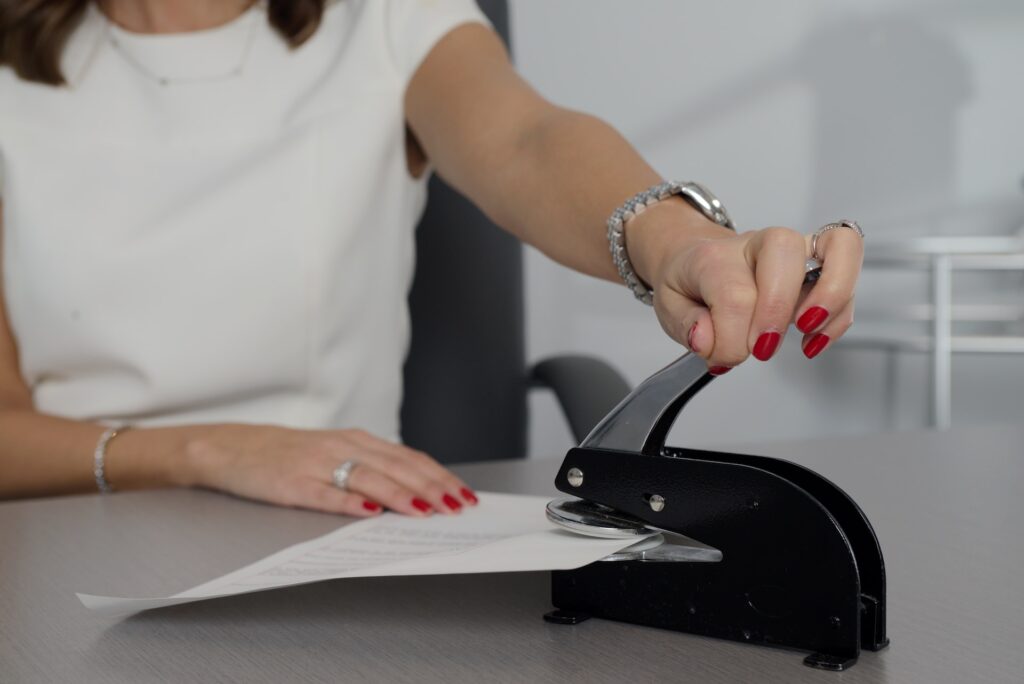Notarization is the official verification of signatures on legal documents by a certified notary public. It involves confirming identities, ensuring the signatories understand the contents that lie within the document, and adding a layer of credibility to various transactions, contracts, agreements, and more.
At the heart of this process lies the often-underestimated hero: the notary seal. Though seemingly minor, this distinctive mark plays a critical role in validating the authenticity of your documents.
But what does a notary seal look like? This is exactly what you will learn in this article! We’ll also explain the differences between notary seals and stamps, their importance, and give a brief rundown on the documents that require notarization.
What does a notary seal look like?
A notary seal is a distinct mark that adds an extra layer of credibility to a notarized document. Generally speaking, a notary seal looks like a round or rectangular stamp, within which some information is embedded.
The central part often contains the notary’s name, their commission number, and the state where they are commissioned. All this information must uniquely identify a notary public. Surrounding it, you might find adornments or the words “Notary Public” and “State of [State]”.
While ink-based seals are commonplace, you can also find professionals who would rather use an embosser, which leaves a raised indentation on the paper. Not only can it completely forgo ink, but it also gives the document a more professional look.
You may also like: what happens if a notary makes a mistake?

Notary seals and stamps: are they any different?
While the terms “seal” and “stamp” are often used interchangeably in notarization, there is a slight difference if you want to get pedantic.
For instance, a notary seal usually refers to an embossed mark. Picture a round or rectangular metal press that, when pressed onto paper, leaves a raised indentation. This process adds a tactile and visual element to the notarial act, creating a distinct impression on the document.
On the flip side, a notary stamp typically involves the use of ink. Once more, it comes as a round or rectangular device that leaves a flat, inked impression when pressed onto paper.
Keep in mind that some states only allow notaries to use an inked stamp, while others allow embossed seals if an inked stamp is also present. Finally, a few others allow notaries to use either, so make sure to check your local notary laws.
In the end, notary seals and stamps serve the same purpose – validating a notarized document – but their method of application varies.
Why are notary seals important?
Sure, notary seals look amazing (especially when embossed), but their importance goes beyond their looks:
- Authentication of a notary public’s signature: the seal acts as a visual verification of the notary’s signature on a document. It adds an extra layer of assurance that the process has been carried out by an appropriately commissioned and authorized notary;
- Confirmation of notarial act: by affixing a notary seal, the notary confirms that they have followed the proper procedures in verifying the signer’s identity and ensuring the document’s compliance with legal requirements. This confirmation is critical for the document’s validity in legal environments;
- Fraud deterrence: whether embossed or stamped, a notary seal looks very distinctive. Unique design or not, seals are very challenging to replicate, which reduces the risk of unauthorized notarizations and document tampering;
- State and justification identification: as mentioned before, a notary seal comes with information regarding the notary public, such as their name, commission number, state of commission, and more. This provides clear identification of the professional and their jurisdiction, which helps in tracking and confirming their authority;
- Visual representation of legitimacy: when individuals encounter a document with a well-placed and clear notary seal, it visually represents the legitimacy of the notarial act, adding a professional touch to the document;
- Legal requirement in some states: in certain jurisdictions, the use of a notary seal is a legal requirement. Failing to affix one may render the notarization incomplete and invalid.

What documents need to be notarized?
Certain documents carry greater weight and require notarization to be legally valid. Here are some common examples:
- Wills and estate documents: last wills and testaments, estate planning documents, living wills, and other related documents often benefit from notarization to prevent disputes down the line, which can be an uphill legal battle;
- Financial documents: loan agreements, mortgage closures, credit reports, financial affidavits, and property deeds usually require notarization to affirm their legal standing;
- Legal agreements and contracts: documents like powers of attorney, lease agreements, real estate contracts, and executorships often deal with legal ownership and responsibility, so they almost always require notarization;
- Adoption and guardianship papers: anything related to adoption proceedings, guardianship agreements, and custody arrangements requires notarization to ensure compliance with the law;
Keep in mind, however, that notaries can refuse to authenticate your documents. While they strive to honor all requests to do so, there are some cases in which they must refuse to proceed with notarization. Check our other article for a thorough explanation of when they can refuse to notarize a document.
Conclusion
As seen throughout this article, notarization is the cornerstone of credibility in the legal sphere. And notary seals, while a seemingly minor thing, are paramount in providing that extra layer of assurance.
Whether imprinted through an embossed seal or an inked stamp, the notary seal is an unmistakable testament to the contents’ authenticity. It also acts as a formal endorsement of the identity and willingness of the signatories, ensuring that the document is trustworthy and legally binding.
Are you looking for professional notarization services?
If you’re around Orlando or Central Florida and require these services, we at Mobile Notary Orlando would be happy to provide them! We are a one-stop shop for all things notarization, delivering services in three different languages (English, Spanish, and Portuguese) with utmost professionalism.
Not only are our prices reasonable, but the process is painless: all you need to do is contact us to schedule a time and a place to meet. Then, a certified agent will notarize all your documents for you, and that’s it!
By the way, did you know we are available 24/7? You may send us a message anytime to schedule an appointment and let us efficiently authenticate your important documents!






